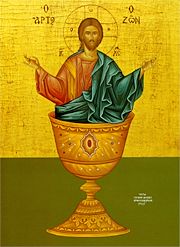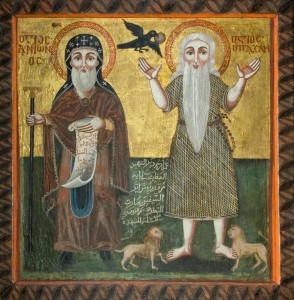“Do not give what is holy to the dogs; nor cast your pearls before swine” (Mat 7:6)
When I was a kid I had a pet‚ a cat‚ and loved it dearly. It slept with me every night and in my teenage years felt at times as my only true friend. But there was no moment during the time we had together‚ that I confused my pet pal with a true human friend; it remained a cat the entire time. There seems to be however a lot of confusion nowadays about animals and their role in our lives. People treat their animals as family‚ take them to beauty salons and spas‚ leave them fortunes in their wills and expect to be joined by them in heaven.
 Just when I thought I heard it all I just stumbled on a recent news story where an Anglican minister went as far as giving communion to a dog. “It was a simple church act of reaching out to a new congregation member and his pet” ‚ the “she” minister swiftly responded to the harsh criticism surrounding her acts.
Just when I thought I heard it all I just stumbled on a recent news story where an Anglican minister went as far as giving communion to a dog. “It was a simple church act of reaching out to a new congregation member and his pet” ‚ the “she” minister swiftly responded to the harsh criticism surrounding her acts.
Some May be asking what is the big fuss? The evolutionists might say: as the dogs‚ after all‚ we all come from animals; we are all products of the same evolutionary process. Why denying Communion to the dogs‚ aren’t they also called to be saved? What is so distinctive about humans that they get all the benefits? Man is no more unique than the other animals‚ it is just the refined product of a distillation process that started by chance and eventually led where we are today.
As shocking as this recent story May be‚ the problem of equating people with animals is not new. Even St. Gregory of Nazianz was facing some of the same controversy in the 4th century: “Men say: man is a microcosmos – and they say this thinking they elevate human nature with this grandiose title‚ but they did not realize that actually they have honored man with the characteristics of the mosquito and the mouse”
In the quest to prove that man comes from animals‚ man is actually diminished to the level of a marginally more advanced living creature and nothing else‚ having very little to distinguish him from his “close relatives” that still dangle from one tree branch to the other. By reducing man to his animal body‚ man is actually abridged to matter and any spark of spirituality is completely denied to him. Man becomes an animal with the illusion of grandeur.
But‚ according to Vladimir Lossky “Human perfection does not consist in what makes him resemble with all creation‚ but in what sets him apart from the created order and makes him resemble his Creator”
Man was created differently than the other forms of life. God created the world by a simple “let there be…” but for man He decided to fashion him in a distinctive manner. “Let Us make man in Our image‚ according to Our likeness; let them have dominion over the fish of the sea‚ over the birds of the air‚ and over the cattle‚ over all the earth and over every creeping thing that creeps on the earth.” (Gen 1:26).
The resemblance with God that makes man different than animals is the rational origin of his soul. “Animals act on impulse (they have urges) but in man there is also “logic”; it is the Grace of God which comes and establishes itself “logically” upon the soul”‚ says Saint Maximus the Confessor. Animals do not possess rationality and have no free will. They possess however‚ through their instincts and the spirit of life planted in them‚ a certain basic understanding of the world‚ enough for them to never fail in recognizing God and serving His will.
This is why Christ did not specifically minister to animals‚ not because they were unworthy‚ or because He didn’t care about them‚ but because the creation already knew Him and obeyed him as God. “The ox knows its owner and the donkey its master’s crib; But Israel does not know.” (Isaiah 1:3). The icon of Nativity shows this clearly by depicting the animals as the first witnesses of the Incarnation.
On the other hand man‚ misusing his God given rationality and betraying his freedom of choice‚ in his disobedience‚ has forgotten Who the Master is and has fallen into sin. Because of man and his sin the entire creation has been turned upside down and exists in the corrupted state we see today.
 Man used to be at peace with all creation; Adam named all the animals and the animals recognized him and did not harm him. (Gen 2:20) But when through sin division was brought in the world animals ceased to recognize man and the entire nature turned against man and against each other. (Gen 3:1’-19‚ Gen 6:1’)
Man used to be at peace with all creation; Adam named all the animals and the animals recognized him and did not harm him. (Gen 2:20) But when through sin division was brought in the world animals ceased to recognize man and the entire nature turned against man and against each other. (Gen 3:1’-19‚ Gen 6:1’)
The current condition of the world is different that what it was in paradise and different than how it will be in the Kingdom of heavens. The cosmos can and will be redeemed and man is its intercessor: “the creation itself […] will be delivered from the bondage of corruption into the glorious liberty of the children of God.” (Rom 8:18-2’).
We see glimpses of this new order and of the renewed relationship between man and animals in the lives of the saints were we encounter a raven feeding the prophet Elias in the wilderness‚ lions living with the desert dwellers like St. Paul of Thebes or St. Mary of Egypt‚ a bear befriending St. Seraphim and so many other examples. This was foretold in the prophecy of Isaiah “The wolf also shall dwell with the lamb‚ the leopard shall lie down with the young goat‚ the calf and the young lion and the fatling together; and a little child shall lead them.” (Isaiah 11:6) These saints have reached again in Christ the state that Adam had in paradise‚ when man was in harmony with the entire creation giving us all a pre-taste of the kingdom to come.
 But this harmony does not mean that we can reduce man to the level of an animal nor we can elevate an animal to the level of man. Each have their distinct role in God’s providence and they cannot be confused. “All flesh is not the same flesh‚ but there is one kind of flesh of men‚ another flesh of animals‚ another of fish‚ and another of birds. There are also celestial bodies and terrestrial bodies; but the glory of the celestial is one‚ and the glory of the terrestrial is another.” (1Cor 15:39-40).
But this harmony does not mean that we can reduce man to the level of an animal nor we can elevate an animal to the level of man. Each have their distinct role in God’s providence and they cannot be confused. “All flesh is not the same flesh‚ but there is one kind of flesh of men‚ another flesh of animals‚ another of fish‚ and another of birds. There are also celestial bodies and terrestrial bodies; but the glory of the celestial is one‚ and the glory of the terrestrial is another.” (1Cor 15:39-40).
Clearly man was given a distinctive role in creation. Man is the only created being that resembles both the heavens and the earth. Man is lifted to the image of God by his rational soul while his animal body caries the weight of the clay. Thus‚ by the will of God man is‚ without overextending his already bloated hubris‚ the central piece of the created world and by fulfilling this divine purpose‚ he redeems the entire cosmos with him. “All things”‚ argues St. Maximos the Confessor‚ ” which have been created by God‚ in their diverse natures‚ are brought together in man as in a melting-pot‚ and form in him one unique perfection— a harmony composed of many different notes.’”
Christ came to redeem man so man can be united with God and through man the whole creation to be made part of this union. Man is called to unite creation with the Creator and the entire nature supports him in His endeavor. This is the proper order of things that man cannot change but can freely choose to respect and use for the accomplishment of his divine potential.
Pearls to the pigs and communion to dogs‚
This is a horrible story to begin with. Though‚ I dare to say‚ its remarkable significance is rather confined to the conceptual realm of things‚ from on Orthodox perspective‚ in view of the fact that it happened in an Anglican congregation‚ through the hands of a “she” minister. The way I take it is that I completely dismiss the idea of a “she” minister (this is the first unsalted ingredient) and than the validity of the sacrament of communion. The degree of conceptual corruption and mutation‚ and the fact that we are actually dealing with a factual precedent is the most troubling and disturbing aspect of things. I only hope we simply witnessed a very isolated act of “conceptual” profanity…that will not be propagated and used any further‚ in practices of other Christian counterparts.
It might as well be a regrettable and very subjective interpretation and act of an individual‚ and it is actually very interesting to follow up on this and to take notice of the way the Anglican church will position itself‚ if at all‚ against this event.
Thank you‚ Fr. Vasile‚ for taking act and for pointing out to and condemning the distorted practices of today’s human – animal relationships‚ as a whole.
Well‚ I am not sure if the Anglican Church really treats this with the gravity it deserves.
In a recent article I see some of the people‚ albeit laity‚ say “it is small stuff”. An apology will probably do for most without any further disciplinary consequences for the minister. This is just another example of the slippery slope the Anglican Church has taken. I pray that they wake up in time.
Here is a recent link about the incident.
http://www.canada.com/life/Anglican+communion+leaves+tongues+wagging/3332621/story.html
Fr. bless‚
Thank you for this excellent article. Having rescued nine dogs over the past fourteen years‚ some of them just plain remarkable‚ I’m definitely a dog lover. And while I sometimes come close to athropomorphizing them‚ they are canine – not human.
I do believe that Christ loves ALL of His creation and I suffer at the comments of those who state that only humanity can be transfigured and “saved”. When I look closely at the character of Christ‚ the Father’s everlasting memory of each and every creature (St. Luke 1’:6)‚ the fact that death was never in His plan for the destiny of any creature (Wisdom 1:1’)‚ and the fact that these little creatures suffer yet have no guilt‚ I must hold out hope that somehow they will be restored at the Eschaton.
As for the Episcopal “church” – it’s already too late. Embracing child slaughter and offering “affirmation” to unrepentant homosexualists is apostasy. The Episcopagan offer to mankind is not life‚ but only death.